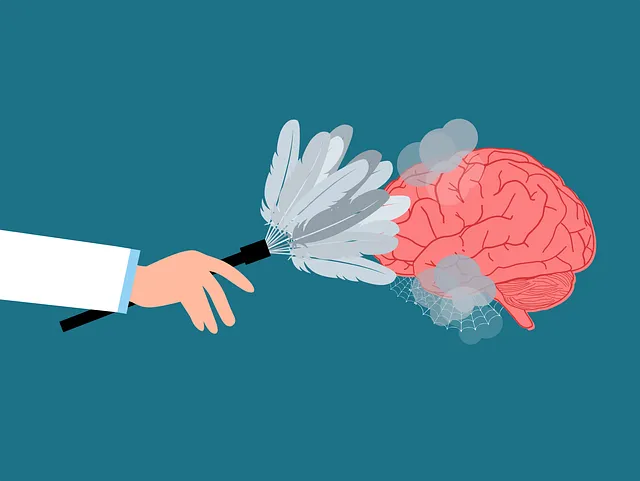In today's fast-paced world, mental wellness is gaining critical recognition as a vital part of overall health. Organizations like the Parker Kaiser Permanente Mental Health Access Center are pioneering innovative solutions, such as mental wellness coaching programs, to improve accessibility to mental health support. By integrating these programs into community, workplace, and educational settings, there's an increased focus on proactive mental well-being. The Parker Kaiser Permanente center offers holistic mental wellness strategies, combining specialized services with patient-centric care, including mood management and inner strength development. Integrating evidence-based practices like Social Skills Training and Stress Reduction Methods improves client outcomes by boosting self-esteem and interpersonal interactions. Measuring success through both quantitative and qualitative methods, along with continuous innovation like Compassion Cultivation techniques, ensures these coaching programs remain effective and tailored to participants' needs.
Mental wellness coaching programs are gaining traction as essential tools for promoting holistic well-being. This article explores the development of such programs, focusing on strategies employed by pioneering organizations like Parker Kaiser Permanente Mental Health Access Center. We delve into understanding the growing need, designing effective support systems, integrating evidence-based practices, and measuring success. By examining these components, we highlight how coaching can significantly enhance mental health access and outcomes.
- Understanding the Need for Mental Wellness Coaching Programs
- Designing Effective Mental Health Support at Kaiser Permanente
- Integrating Evidence-Based Practices into Coaching Strategies
- Measuring Success and Ensuring Continuous Improvement
Understanding the Need for Mental Wellness Coaching Programs

In today’s fast-paced world, mental wellness is an increasingly vital aspect of overall health. This need has prompted organizations like Parker Kaiser Permanente Mental Health Access Center to explore and develop innovative solutions, such as mental wellness coaching programs. These programs aim to fill a gap in accessible mental health support, particularly for individuals who may not have easy access to traditional therapy or counseling services. By integrating these initiatives into community settings, workplaces, or educational institutions, there’s a growing emphasis on proactive mental well-being.
The demand for such programs is driven by the recognition that fostering inner strength and confidence boosting techniques are essential components of holistic mental health education. Well-designed Mental Health Education Programs focus not just on identifying and managing mental health issues but also on empowering individuals with tools to navigate life’s challenges. This shift reflects a broader societal movement towards destigmatizing mental health conversations, ensuring that everyone has the opportunity to develop and maintain a robust sense of psychological well-being.
Designing Effective Mental Health Support at Kaiser Permanente

At Kaiser Permanente, designing effective mental health support involves a multifaceted approach that combines specialized services with a patient-centric perspective. The Parker Kaiser Permanente Mental Health Access Center serves as a beacon for individuals seeking comprehensive care, offering not just treatments but also tailored strategies for mood management and inner strength development. This holistic model recognizes that mental wellness is intricately linked to overall health, encompassing both physical and emotional aspects.
Through innovative programs, the center provides crisis intervention guidance tailored to diverse populations, ensuring accessibility and affordability. By integrating evidence-based practices with cultural sensitivity, Kaiser Permanente aims to empower individuals to take charge of their mental well-being. This dedicated effort not only addresses immediate crises but also fosters long-term resilience, enabling individuals to navigate life’s challenges with enhanced coping mechanisms and a renewed sense of equilibrium.
Integrating Evidence-Based Practices into Coaching Strategies

Integrating evidence-based practices into mental wellness coaching strategies is a critical step towards effective and impactful interventions. The Parker Kaiser Permanente Mental Health Access Center emphasizes the importance of leveraging scientific research to improve client outcomes. One such practice is Social Skills Training, which helps individuals develop and enhance their interpersonal interactions, fostering better connections and reducing social isolation. This approach has been shown to significantly boost self-esteem, a key factor in promoting overall mental wellness.
Additionally, incorporating Stress Reduction Methods into coaching strategies can empower clients with practical tools to manage daily pressures. By teaching mindfulness techniques, cognitive-behavioral strategies, and relaxation exercises, coaches enable individuals to achieve better resilience against stress. These evidence-based methods not only enhance the effectiveness of coaching but also ensure that clients gain accessible, long-lasting coping mechanisms that they can apply in various aspects of their lives, contributing to a holistic improvement in mental wellness.
Measuring Success and Ensuring Continuous Improvement

Measuring success and driving continuous improvement are paramount when developing mental wellness coaching programs, particularly considering models like those found at the Parker Kaiser Permanente Mental Health Access Center. To assess progress, a multi-faceted approach is essential, incorporating both quantitative and qualitative metrics. This may include tracking client satisfaction scores, reduction in symptoms through standardized assessments, and increases in coping mechanisms reported by participants. Additionally, regular feedback from clients and coaches can provide valuable insights into the program’s effectiveness and areas for enhancement.
For ongoing improvement, integrating innovative practices like Compassion Cultivation Techniques and Mind Over Matter Principles can enrich the coaching experience. By fostering a sense of compassion towards oneself and others, these methods promote resilience and emotional well-being. Equally, Mind Over Matter Principles encourage individuals to challenge negative thought patterns and develop positive, empowering beliefs, ultimately contributing to sustained mental wellness. This continuous cycle of evaluation and innovation ensures that coaching programs remain relevant, effective, and tailored to the evolving needs of their participants.
Mental wellness coaching programs, as demonstrated by Parker’s experience at the Kaiser Permanente Mental Health Access Center, are vital in enhancing individuals’ overall well-being. By integrating evidence-based practices and focusing on continuous improvement, these programs can significantly impact positive outcomes. The success of such initiatives ensures a more accessible and effective support system for mental health, ultimately fostering healthier communities. This approach highlights the potential for organizations to revolutionize mental wellness management and create sustainable change.






